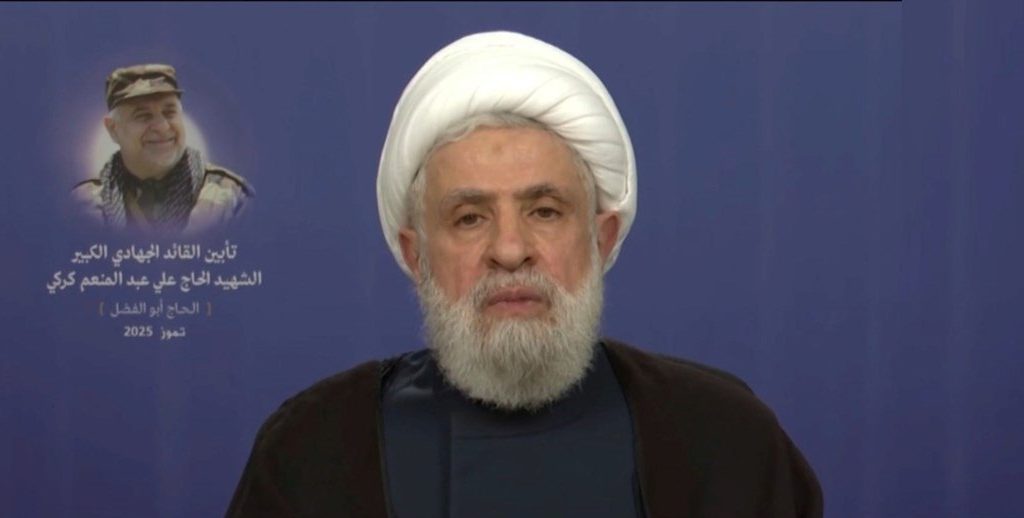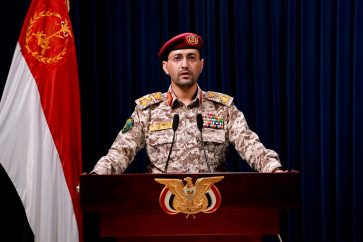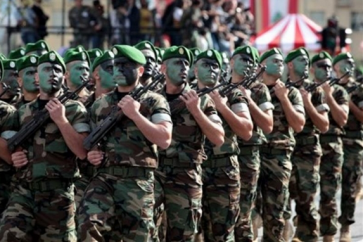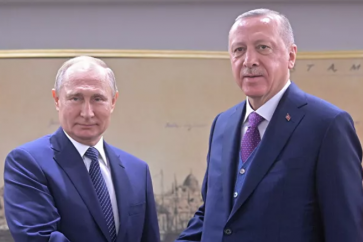Delivering a televised speech to eulogize the Resistance Commander Martyr Ali Karaki (Abu Al-Fadl), Sheikh Qassem maintained that this Resistance was founded by Imam Musa Al-Sadr and strengthened by the righteous martyrs, foremost among them His Eminence Sayyed Abbas Al-Moussawi, His Eminence Sayyed Hasan Nasrallah, and His Eminence Sayyed Hashem Safieddine.
“The Resistance has delivered achievements over 42 years—from 1982 to 2024—including the liberation of Lebanon in 2000, preventing ‘Israel’ from occupying the country again in 2006, and maintaining Lebanon’s stability from 2006 to 2023, during which ‘Israel’ could not launch any aggression for 17 years.”
During the Battle of The Formidable in Might, this Resistance prevented ‘Israel’ from reaching Beirut, Sheikh Qassem added.
“The core mission of this Resistance is liberation and protecting Lebanon from occupation, preventing ‘Israel’ from settling, and stopping the Israeli entity from dictating Lebanon’s choices and future. Hezbollah fully implemented the ceasefire agreement south of the Litani River, and the Lebanese state deployed the army wherever it could.”
Sheikh Qassem noted that the Lebanese state, Hezbollah, and all the resistance forces fulfilled everything required of us in the agreement, while ‘Israel’ implemented nothing.
“For eight months, the Zionist aggression has continued. The whole world acknowledges that ‘Israel’ committed 3,800 violations.”
“They discovered that the agreement served Lebanon’s interests,” His Eminence added, “That’s why they sought to amend it and resorted to field pressure in hopes it would lead to changes.”
“All this pressure did not alter the agreement. Today, the United States is proposing a new agreement—as if the 8 months of violations had never occurred. The new agreement absolves ‘Israel’ of all its previous acts of aggression.”
Sheikh Qassem pointed out that the US and ‘Israel’ discovered that the ceasefire agreement does not achieve the goals they seek, adding that the only justification for this aggression is the disarmament of Hezbollah.
“Why does ‘Israel’ continue its attacks on Syria and carry out airstrikes when there is no threat at all?”
Hezbollah leader noted that, under the pretext of Israel’s security, no one in the region is allowed to raise their head.
“Why did ‘Israel’ bomb Iran under the excuse of a nuclear threat, even though all international inspectors confirmed the program was peaceful? It simply wants to eliminate Iran, but Iran managed to prevail.”
“We do not see ‘Israel’ as a state that simply launched an attack and might retreat tomorrow if we take certain measures. No — ‘Israel’ is expansionist. Even normalization with some Arab countries is just an another step in its plan to annex the region.”
Sheikh Qassem indicated that Syria is expected to be entirely disarmed and placed under Israeli orders — a scenario of Israeli management of Syria.
“Can we accept this for Lebanon? Have we not seen what is happening in Gaza — a genocide of Palestinians under direct American supervision?”
Sheikh Qassem recalled that the US President Donald Trump had said that ‘Israel’ is a small “country” and claimed that it had the right to expand through occupation (Riviera plan).
The issue isn’t just disarmament; it is part of Israel’s broader expansionist agenda, according to Sheikh Qassem who added that the weapons are an obstacle because they have allowed Lebanon to stand on its feet and prevent “Israel” from advancing further.
“As Hezbollah, Amal Movement, the Resistance, and as a sovereign movement that seeks Lebanon’s independence and believes that Lebanon is the final homeland for all its people, we all abide by the Taif Agreement and its provisions. We feel we are facing an existential threat to the Resistance, its environment, and to Lebanon in all its sects.”
Sheikh Qassem warned that all sects in Lebanon are under threat—just look at what is happening in Syria and Palestine; even the Catholic Church in Gaza was bombed.
“Look at the atrocities committed in Syria by certain armed groups—slaughter and brutality. Today, if a decision is made, it wouldn’t take long for an assault to come from eastern Lebanon.”
The Resistance possesses the power of faith and conviction—military capabilities are simply one part of the strength rooted in our stance, Sheikh Qassem maintained.
“If we defend and suffer significant losses—and that is expected—we still have hope. If we confront them, we can shut the door on them and open one toward liberation.”
Lebanon is facing three real dangers: ‘Israel’ from the southern border, ISIL-like tools on the eastern border, and American tyranny, which seeks to dominate Lebanon, impose its guardianship, and cripple Lebanon’s ability to move or even survive.

Hezbollah Secretary General called for unity among the Lebanese, saying: “Let us unite in our stance, work toward the top priority, and once the danger is removed, we are ready to discuss a national defense strategy and national security doctrine.”
Sheikh Qassem urged the Lebanese not to offer any service to Israel, adding that, in confrontation, even America cannot achieve its goals.
“We will not abandon our faith or our strength. We are ready for confrontation; surrender and submission to ‘Israel’ are not options. ‘Israel’ will never lay its hands on our weapons.”
“We know confrontation comes at a high cost, but surrender leaves us with nothing,” Sheikh Qassem said, “Learn the lessons from what’s happening across the region and the world.”
We are fully prepared for a defensive confrontation if ‘Israel’ attacks, Sheikh Qassem emphasized.
“Do not place your bets on any internal Shiite divide—the Resistance’s base is united, and Hezbollah and the Amal Movement have a strategic alliance. Do not wager on the three presidents—they possess the wisdom and cooperation needed to lead the country out of its crisis in the right way.”
“As long as we are alive and as long as we still draw breath, ‘Israel’ will not achieve its goals. We can guarantee this, for we have an extraordinary popular base unlike any seen in history, ready to sacrifice for the sake of dignity, honor, and Lebanon’s independence,” Sheikh Qassem maintained.
Sheikh Qassem started his speech by saying that Hezbollah chose this day to hold the memorial for the great jihadi commander, Martyr Ali Abdul-Munim Karaki “Hajj Abu Al-Fadl” because he was martyred alongside the master of the nation’s martyrs, His Eminence Sayyed Hassan Nasrallah, on September 27, 2024, and that there was no opportunity then for a dedicated memorial or formal ceremony.
“The great jihadi commander, Martyr Ali Abdul-Munim Karaki (Hajj Abu Al-Fadl) has a right upon us, as he was one of the aides in the Jihadi Council of the Secretary-General and a prominent figure whom people should get to know.”
“The martyr commander ‘Abu Al-Fadl’ was born in May 1962. He was faithful from a young age, a devoted lover of Ahlulbayt (peace be upon them), held a university degree, and was part of the first generation of Islamic activism — from the early and founding generation.”
The martyr commander ‘Abu Al-Fadl’ laid the foundations for Islamic activism in West Beirut, established the Musab bin Umair Scout Troop, and worked to develop Al-Ahed Sports Club. He joined the Amal Movement (the Movement of the Deprived) in 1974 and was one of the key figures involved in shaping the military structure of Hezbollah, Sheikh Qassem added.
“The martyr commander ‘Abu Al-Fadl’ confronted the 1982 ‘Israeli’ invasion in the Battle of Khaldeh, where he sustained a severe injury. He also co-planned, along with the great jihadi commander Hajj Imad Mughniyeh, the martyrdom operation of Ahmad Kassir, and founded resistance formations along the border strip. The martyr commander (Abu Al-Fadl) held military command over the South until 1996. He planned and led many operations leading up to the liberation in 2000, and played a prominent role in repelling the aggressions of 1993, 1996, and 2006. After the 2000 liberation, he headed the Foundation for the Wounded for two years.”
Sheikh Qassem noted that the martyr commander ‘Abu Al-Fadl’ played a central role in “Al-Aqsa Flood” and followed developments actively, adding that despite several assassination attempts, he never left South Lebanon.
“The martyr commander ‘Abu Al-Fadl’ led Sayyed Al-Shuhada Headquarters —i.e., the southern region—from 2006 until his martyrdom. He took part in planning and supervising battles that took place in Syria against the Takfiris at the time. The martyr commander ‘Abu Al-Fadl’ served as a central military commander for two years, a member of the Jihadi Council, and a jihadi aide to the Secretary-General His Eminence Sayyed Hassan Nasrallah since 2008.”
Sheikh Qassem pointed out that the martyr’s personal life was that of a devout, humble man—close to the people and easy to get along with—yet steadfast in his commitment to truth.
“He would complete the Qur’an in the blessed month of Ramadan, observe i’tikaf in the mosque, and regularly perform night prayers. His final testament included: the recitation of ‘Ziyarat Ashura’.”
Source: Al-Manar English Website




